Immigration
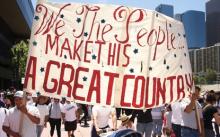
The Associated Press announced Tuesday it is dropping the term "illegal immigrant" from its Stylebook. Citing concern for “labeling people, instead of behavior,” AP’s Senior Vice President and Executive Editor, Kathleen Carroll, wrote, “The Stylebook no longer sanctions the term 'illegal immigrant' or the use of 'illegal' to describe a person. ...'Illegal' should describe only an action.”
This change is a huge win for those working on immigration reform, including the staff at Sojourners. Last fall, Sojourners joined many others in calling on the Associated Press to change the term.
“The media’s usage of the word 'illegal' is dehumanizing and distorting," wrote Sojourners Immigration Campaigns Fellow Ivone Guillen in October. "When used by journalists, it introduces a bias into their reporting and risks prejudicing the reader against the needs, concerns, and humanity of immigrant communities, regardless of their documentation status.”

The night was cold and dark as the family approached the border. Ahead of them were miles of desert that would test their will and drain their stamina. What they were doing defied the law. But they were a family, and families will do anything for the sake of their children.
The law they defied was that of Herod. The family: Joseph, Mary and the Christ-child.
As Christians prepare to celebrate Easter, let us remember that the life that ended on the cross began on the road. This Easter, let us remember that Christ the Savior began his life as an immigrant, fleeing the land where he was born to escape Herod’s wrath.
Easter is a holiday of new beginnings. It welcomes a new season. It is a time to start fresh. At the heart of Easter is a magnificent reservoir of grace. Of this holiday, Katherine Lee Bates reflected, “It is the hour to rend thy chains, the blossom time of souls.” Easter is a time to set people free, fix things that are broken, watch souls blossom — all for glory of the risen Christ.

“Blessed are the peacemakers, for they will be called children of God.
“Blessed are those who are persecuted for righteousness’ sake, for theirs is the kingdom of heaven.
“Blessed are you when people revile you and persecute you and utter all kinds of evil against you falsely on my account. Rejoice and be glad, for your reward is great in heaven, for in the same way they persecuted the prophets who were before you.”
Social Justice Reflection:
Jesus was a peacemaking, blessed child of God, but he also was an “other.” Reviled and persecuted, he was the paperless son of displaced immigrant parents. The prophetic iconoclast. That guy who hung out with those people, the type most modern leaders would not associate with, except for a photo opportunity at a Thanksgiving Day soup kitchen. Let us remember on Sunday when we celebrate his resurrection, that Jesus was crucified because he was an outsider whose way of doing things scared and angered the powers-that-be.
We have become a nation that loves to “other” people. We point out their differences as reasons they cannot be trusted, as evidence that they take too much from the rest of us or threaten our well-being. We have lengthy, bitter debates about allegiance and legitimacy, and we reject those who do not meet our standards. We know who belongs, and the others need to clear out and leave us alone with our worldly possessions, our rules, and our way of doing things.

More than six in ten Americans support a pathway to citizenship for immigrants, a survey out today from the Public Religion Research Institute finds.
63 percent of Americans support a path to citizenship, including a majority of Republicans, Independents, and Democrats, and majorities among every major religious group.
“Proponents of immigration reform are unlikely to find a more favorable moment [in the political climate] than now,” said EJ Dionne, Senior Fellow at the Brookings Institution and a columnist at the Washington Post, as part of a survey panel this morning.
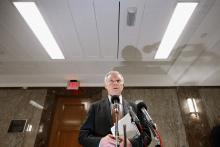
The momentum for immigration reform is building across the country, but leaders in Washington are often the last to realize the seismic shifts taking place. The most recent example is when Alabama Sen. Jeff Sessions made the claim that there is no “moral or legal responsibility to reward somebody who entered the country [without documentation].”
No moral responsibility? Many Christians believe otherwise.

Immigrants are a blessing, not a curse. They are assets, not deficits. I have learned this the hard way after seven years working with the New York City New Sanctuary Movement. We have accompanied 67 people on the verge of detention or deportation, and we have lost only three of them.
These people are restaurant owners — employers. Some run small high tech start-ups; others raise children on their own, grouping with other parents to take care of them. They live under the constant fear of disruption to their lives and constant trepidation about whether their children will be separated from them. Many have been picked up for small offenses, like traffic violations and gone to jail only to luckily be released. But they have still have shown resilient courage, that miracle of guts that keeps them going inside the constant fear and the constant harassment. Immigrants are spiritual and economic blessings, not curses. They are assets, not deficits.
For the past 19 years I’ve worked and lived in inner city East Dallas among very poor individuals and families. CitySquare, the faith-based non-profit that I lead, last year served more than 50,000 different individuals. We work hand-in-hand with low-income people to see life improved and turned toward real, lasting, legitimate opportunity. Our day-to-day work involves hunger relief and nutrition improvement, health care delivery, wellness programs, legal services, housing options, workforce training and job placement, public policy initiatives, and community organizing. It has been in this dynamic context that we’ve become very involved in advocating for comprehensive immigration reform.
Over half of our friends and neighbors who come through our doors seeking a better life are undocumented residents. Since our entire approach to the community is based on building strong, personal connections and relationships across and beyond the typical barriers of income, gender, race, and religion, we’ve become very aware of the plight, the needs, and the rights of our immigrant friends. Tens of thousands of residents of the Dallas metro area need the relief that comprehensive immigration reform promises.

During this time of Lent I’ve been meditating anew what it means to be a follower of Jesus. Interestingly, the only Gospel to contain the word ekklesia — church — is the Gospel of Matthew. Also in Matthew is an interesting take on the call of the disciples. Matthew 10 begins with the premise that as disciples we are all are potentially homeless in a world that has radically different values. Immediately after Jesus calls the 12 disciples, he warns them that they will be misunderstood, mistreated, and often on the road. Then Jesus gives a particular imperative for discipleship. I call it the “cup of cold water” discipleship test. Part of the discipleship marker is hospitality. A cup of cold water is a reprieve, a welcome, a new start.
A cup of cold water is the minimal requirement for what the Scripture calls hospitality or in the original language, xenophilia — love of the stranger. Jesus says that whoever gives a cup of cold water to these nomadic disciples will not fail to receive their reward. Hospitality is a Christian virtue. The writer of the book of Hebrews reminds us, “Do not forget to show hospitality to strangers for some have entertained angels unaware.”

Introduction from Lisa Sharon Harper: Every once in a great while you meet someone who carries in their very body the scars of injustice that we talk about so much at Sojourners. These scars leave permanent reminders of the profound need for every follower of Jesus to follow him in word and deed. It is my great pleasure to introduce you to my friend and colleague, Ivone Guillen. As Sojourners’ Immigration Campaigns and Communications Associate, Ivone has worked tirelessly for the passage of just immigration reform for two years. As a formerly undocumented immigrant, she bears the scars of our unjust immigration system and has experienced the healing that came from changes in immigration policy last year. Please read Ivone’s story. It reflects the stories of millions of people in church pews across the country; people made in the image of God, people waiting for that image to be fully recognized and set free inside our borders.
I remember clearly the day I heard the announcement on deferred action for childhood arrivals (DACA) as I felt an overwhelming surge of emotions in that one moment. A path to opportunity, however fragile and short-term, had finally been created for undocumented young people wanting to become full members of American society.
As I sat on the sofa on the morning of June 15 in front of the television and next to my computer, I felt anxious, excited, and dazed at the same time. There I was, listening to one of the biggest announcements ever made in my lifetime, and it directly impacted me. It was a surreal moment since I had been working with the advocacy community for almost two years and had seen difficult developments take place at the state level on the issue. Then and there, I felt that all of my work was paying off and that change could be achieved with enough persistence and pressure. It was a moment that most people wish to live and see, especially those who have worked in the movement for decades but seldom experience the ultimate triumphs of slow processes.
New Abolitionists
Refuse to Do Nothing: Finding Your Power to Abolish Modern-Day Slavery, by Shayne Moore and Kimberly McOwen Yim, is a guide to how regular people, juggling the everyday demands of family and work, can become activists fighting human trafficking and slavery. IVP Books
Leaders of the Faith
Different writers pay tribute to the work and witness of Catholic sisters in Thank You, Sisters: Stories of Women Religious and How They Enrich Our Lives, edited by John Feister. These strong, faithful women are inspiring, no matter your tradition. Franciscan Media
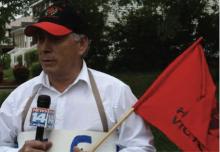
A RECENT ONLINE profile referred to farm worker labor union leader Baldemar Velasquez as both "militant" and "genius." It's hard to argue with either of those designations for the 66-year-old founder of the dynamic Farm Labor Organizing Committee (FLOC). The Toledo, Ohio-based union has used a David-vs.-Goliath style to bring corporate giants to the collective bargaining table, thereby improving the living and working conditions of perhaps the least powerful worker group in the nation.
Velasquez, an ordained evangelical Christian who received a MacArthur Fellowship in 1989, simply sees FLOC's work as God's work, and his opponents might consider following the wisdom of the Pharisee Gamaliel, who said of the apostles, "I tell you, keep away from these men and let them alone ... You might even be found opposing God!"
Velasquez, who founded FLOC in 1967, has yet to lose a battle. A 1967 strike Velasquez led against Ohio tomato growers resulted in two dozen growers signing union contracts. A national FLOC boycott of Campbell's Soup in the 1980s resulted in a three-way collective bargaining agreement that raised wages and improved working conditions for tomato workers. A six-year campaign in North Carolina resulted in another three-way deal between FLOC, cucumber growers, and the Mt. Olive Pickle Company. Today, FLOC is going after another giant, Reynolds American, the second-largest U.S. producer of tobacco products.
BREAKTHROUGHS ON immigration reform will make life easier for some Latino immigrants, but in the sweltering, often-toxic fields where farm workers toil each summer from Maine to California, conditions can still be dehumanizing and dangerous. There is a silver lining, however. With the burgeoning growth of the nation's Latino population, there are more advocates than ever working to improve the plight of the men, women, and often children who do hard labor on our nation's farms.
With a mostly young, deeply committed staff, the Florida-based Coalition of Immokalee Workers (CIW) is doing solid grassroots work to make life better for workers in the state's tomato industry. With cooperation from 11 food retail and food service corporations, CIW has implemented the Campaign for Fair Food, which has brought modest wage increases, worker protections, and grievance procedures to farms that produce 90 percent of the state's tomato crop.
Using a worker-led administrative structure and significant public pressure, CIW has brought companies such as McDonald's, Burger King, Pizza Hut, and KFC into its program that asks corporate partners to kick in an extra penny per pound for the tomatoes they buy. That premium is passed on to growers to increase worker pay.
Elbin Perez, 23, a farm worker from Guatemala, has been working in the U.S. for six years, sending part of his wages back home to his parents and five siblings. As a CIW member, Perez leads "worker-to-worker education programs." Those trainings educate workers about CIW's code of conduct, which growers have agreed to uphold. Reforms include use of time clocks, guaranteed minimum wage, and water and shade breaks.
OVER THE PAST few years, we have seen tangible proof that creation is terribly off balance. Global warming is causing droughts and heat waves around the world and is making hurricanes more powerful. In my hometown of New York City, we have experienced the effects of severe weather: Hurricane Irene in 2011 and, most recently, the devastation of Hurricane Sandy. Sandy was an eye-opening demonstration that climate change is a poverty issue, a race issue, and an immigration issue.
Though neighborhoods of all socioeconomic statuses were affected by Sandy, poorer communities are taking longer to recover. Many of them were without electricity, heat, and water longer than were more affluent communities. For instance, residents of Red Hook's public housing projects in Brooklyn were without power and water for two weeks after the storm. My cousin Dabriah Alston, a Red Hook resident, told me that the city ignored residents' repeated requests for information about when the heat would come back on: "The bottom line is, they don't care about us. Projects are filled with poor folk, and as we all know, the poor are seldom a priority."
Hurricane Sandy shone an uncomfortable light on racial and economic disparity in New York City. As someone who was born and raised in Brooklyn, I am very familiar with Red Hook's history of poverty, and the neglect by local government. For example, only when the community near the housing projects began to gentrify did the city start to repair the nearby subway station.
Sandy also exposed how, in the city that is home to Ellis Island, immigrants live in an environment of fear. Although families of mixed immigration status qualify for some FEMA disaster assistance, and families of any status qualify for emergency food aid, many did not apply for it because they feared deportation, as I learned at a post-Sandy meeting of the Occupy Faith group. The environment of fear magnified the impact that the hurricane had already had on the poor: Many immigrants are non-salaried workers who missed a week of their already-low wages due to the hurricane.
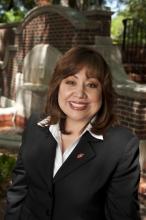
When United Methodist Bishop Minerva G. Carcaño talks about tussling with political bigwigs on the topic of immigration reform, she is poised, yet forceful.
“Immigrants can stay as long as they don’t ask for more than we want to give them, and as long they keep serving our needs at whatever pittance of a pay we want to extend to them,” Carcaño said in an interview in her office here. As the first female Hispanic bishop elected in the nation’s second-largest Protestant denomination, Carcaño has had a lot of practice keeping her cool, especially when it comes to discussing divisive politics.
“When people begin to say that’s not fair, that’s not just, then that ruffles feathers.”
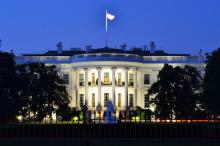
A meeting today of faith leaders with the president on immigration reform opened and closed with prayer.
This was my prayer at the end:
Thank you Lord, for this circle of leaders around the table and how you have brought us together to help welcome the stranger in our midst — to fix this broken immigration system that breaks families and lives.
Thank you for the leadership of Barack Obama in making comprehensive immigration reform such a high priority in these critical months ahead. Guide and direct him to find a genuine bipartisan political path to accomplish something so important that has been needed for so long. We thank you for both the Republicans and Democrats who are coming together to make that possible.
[Continued]
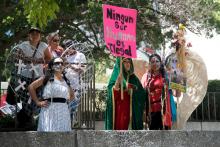
Charles Carpenter
George Murray
Nolan Harmon
Paul Hardin
Joseph Durick
Earl Stallings
Edward Ramage
Milton Grafman
In towns all across America, streets are not named after them. School children do not learn about them. No one waits in line to see the homes where they were born. They are ... simply forgotten.
They weren’t necessarily bad men. They weren’t unimportant men. They were men of influence, men with a voice and the respect of their community. Most would have agreed; they were good men, according to one, “men of genuine good will.” While evil men are remembered and great men are enshrined, these men … just forgotten.
They are forgotten for being on the wrong side of history. Men forgotten for being silent when “a word fitly spoken” could have made a difference. Men who are forgotten for valuing comfort and stability over justice and compassion. Forgotten because they were unwilling to call out the status quo, and show it for it was … cruel and unjust.
These are the eight men on the other side of Martin Luther King’s “Letter from a Birmingham Jail.” The recipients. Eight well educated white pastors, priests, and rabbis who by God’s providence led reputable congregations in Birmingham, Ala., in 1963.

On a beautiful Sunday afternoon just a few weeks ago, a friend of mine courageously crawled under a Border Patrol truck. And he wasn't changing the oil. Raúl Alcaraz Ochoa was riding his bike to work when he came upon a scene that is all too common in southern Arizona, where racial profiling by the Tucson Police Department is permitted through the notorious legislation SB1070 and Border Patrol roam our streets. Multiple police cars and Border Patrol trucks were surrounding a vehicle apparently pulled over for traffic violation. When Raúl arrived, he saw five children crying for their father and a pregnant woman sitting terrified in the vehicle. Handcuffed and being transferred to Border Patrol custody was a Latino man named René.
Raúl had to think and act quickly, and he crawled under the Border Patrol truck. He began sending texts that spread quickly throughout a community protection network designed to alert community members and advocates about raids, abuse, and racial profiling by immigration and law enforcement. Media and supporters responded within minutes, just as Raúl was pepper sprayed, Tazed, and pulled out from under the vehicle. Both men spent the night in custody, and public demands were widespread for their release. While Raúl was released the next day, top officials of Border Patrol and the Department of Homeland Security ignored pleas for René to rejoin his family, and he was promptly deported to Mexico.

A common sentiment that’s expressed by both the left and the right on the issue of immigration reform is that immigrants need to prove their faithful adherence to the law and contribution to society before they’re put on some path to citizenship. It's redemption by works. It’s a reasonable means to verify their willingness to contribute to society. But a disconcerting irony dawned on me amid all this mutual give-and-take language we hear about immigrants; that is, many citizens themselves do not heed the same exhortation to contribute to their country today.
This is encouraged by the fact that citizenship today is identified entirely by a piece of paper, not by a way of life — by ink, not by deed. Although one’s citizenship technically includes a whole list of rights and duties, the fulfillment of these rights and duties is not a part of the identification process. This is understandable, as it’s very difficult to tell whether someone is trying to contribute to the state or merely trying to get what they can out of their legal privileges. I'm not out to start a Civil Reformation or something. But these thoughts have reminded me that the standard the Bible sets for Christian citizenship in heaven is something else entirely.
New Calvinists today have hammered home the doctrine of justification by faith through grace, not by works or legalistic moralism. Kingdom citizenship is claimed by faith in Christ. Got it.
Yet, Scripture is emphatic that Kingdom citizenship is not identified by faith alone, but also by works.

Our distaste for people who cut in line remains unchanged as we grow up. Whether someone gets to the front of the lunch line or the airport security check before us in an unfair way, our annoyance is raised. People who steal our parking spots during the Christmas season are the recipients of our worst thoughts. We might — just might — yell a string of expletives and death threats at anyone who has wronged us on the road or in a parking lot.
It’s not just about being orderly and following the rules. Instead, we rue the flouting of justice and fairness. I have been waiting patiently in line; what gives you the right to deem yourself better than me?
Yet if we’re honest, we will quickly realize that such outrageous reactions to outrageous behavior are no better than the line cutter or parking space thief. Moreover, our sense of injustice is quite attuned to moments of personal grievance even as we neglect how our actions may harm others. If anything, these moments of rage reveal much more about us than those we think have aggrieved us.

"'Lord, when was it that we saw you hungry and gave you food, or thirsty and gave you drink? And when was it that we saw yo a stranger and welcomed you, or naked and gave you clothing? And when was it that we saw you sick or in prison and visited you?' And the king will answer them, 'Truly I tell you, just as you did it to one of the least of these who are members of my family, you did it to me.'"
--Matthew 25. 37-40
All this immigration talk reminds me of an encounter my wife and I had at a fast food restaurant in Atlanta. The night manager was Hispanic. He came by our table to make sure everything was all right. We started talking. I told him how troubled I was over our immigration debate.
That casual remark opened his door wide. He told me how scared many of his friends were. Some had already left the state. He told me they only wanted to work and send money back home where things were so tight. One very sick friend, he said would not go to the doctor or hospital because she was afraid of being deported. He told me he kept reading that these immigration laws had nothing to do with racial profiling.
He shook his head. “I have been stopped six times in the last few months mostly because I was Hispanic.”